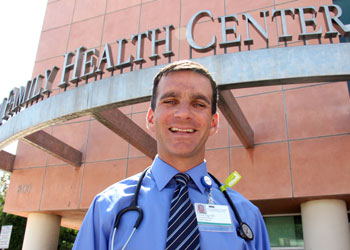Universal screening for adverse childhood experiences can help reduce toxic stress effects, says UCI Health expert
UCI Health family medicine specialist Dr. Charles Vega says clinicians are an important link in prevention and management

IN THE NEWS: A 2019 report by the Centers for Disease Control and Prevention put a spotlight on the many negative health effects linked to adverse childhood experiences (ACEs), including depression, obesity, heart disease and substance abuse.
 UCI Health family medicine specialist Dr. Charles Vega recently wrote in a Medscape commentary that clinicians are an important part of addressing the issue.
UCI Health family medicine specialist Dr. Charles Vega recently wrote in a Medscape commentary that clinicians are an important part of addressing the issue.
“Clinicians still play a vital role in the prevention and management of ACEs among their patients. Akin to gathering a patient's past medical history or family history is initiating universal ACE screening in practice and exploring related topics in conversation.”
Vega acknowledges that universal screenings in primary care practice can be time consuming, but ACEs screenings are an important chance to get of ahead of some of their effects.
“The burden of universal screenings in primary care is high. Without ACE screening, however, the opportunity to address downstream health effects from toxic stress may be lost.”
Vega is also a professor of family medicine at UC Irvine School of Medicine and the director of the UC Irvine Program in Medical Education for the Latino Community (PRIME-LC) Family Medicine Residency. For more than 25 years, he has seen patients at the UCI Health Family Health Center ― Santa Ana, the largest and oldest federally qualified health center in Orange County.
His academic interests include access to quality care, compassionate medical care for underserved populations and developing training programs that promote this vision.




